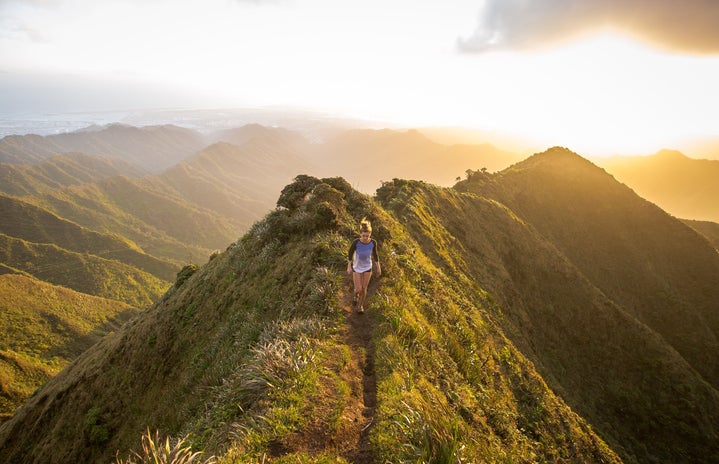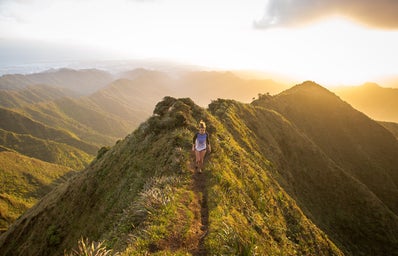With Earth Day looming over me at the end of this week, I can’t help but reflect on the state of the natural world and the silence that surrounds this reflection. Every day we walk on the earth, drive on her and cover her in concrete. We try to contain her, put borders on her, and we take more than we give. Yes, there are beautiful efforts that aim to salvage the natural world through parks programs, but even these efforts are limited in terms of accessibility. In what can seem like a daunting world full of melting icebergs and gate-kept outdoor experiences, it can be difficult to focus on the hope that does exist amongst it all.
My own seasonal work for Washington State Parks has definitely fueled these reflections. As a Park Aide, I spent the better part of two summers in outdoor spaces, facilitating and observing the general public’s experiences with nature. This week, I sought out inspiration from women who are making the outdoors a better place for all, and I’ve been overwhelmed by the amazing stories I have come across.
For this piece’s main focus, I looked to none other than my own coworker in Parks, Alicia Burki,a Maintenance Mechanic for Washington State Park’s Kitsap area. Her insights on outdoor recreation paired with her experiences are particularly moving, and I am grateful for her knowledge and leadership in Parks.
Alicia’s journey to Parks is one that involved lots of literature and exploration: “We didn’t grow up with a TV, so we spent most of our leisure time as kids outdoors, playing and exploring, [sometimes] with our parents around, but I’d say more often than not, unsupervised.” In the next phase of her life, Alicia expanded her view of nature through the lens of transcendentalist writers like Thoreau and Emerson while being homeschooled. “To indulge a little bit into the homeschool stereotype, we were reading the Bible too,” Alicia jokes. “During the same time period, we were living aboard a sailboat, and that’s when I first discovered recreation as a possible vocation. Our family spent a month island hopping in the San Juans and throughout Canada, and those were my first experiences visiting Washington State Parks. So, I guess you could say that’s when the seed of exploration was planted.”
Exposure to nature’s wonders and the freedom to explore that world has been influential on Alicia’s entire life. While the outdoors seemingly have no borders, they are not as accessible as they should be to all, which Alicia acknowledges as just one of the major gaps in outdoor recreation: “As far as gaps go…man, where do I start? If we’re looking at outdoor recreation within the vacuum of Western ideology and values, we’re seeing disparities across the board in terms of accessibility, inclusion, and cultural humility towards people of all walks of life. Depending on the industry or agency, there are major disparities in providing livable wages in the current economy. The [disproportionate] ratio of men to women in leadership roles. There’s a lack of diverse representation in management, in terms of people of color. There’s financial and socioeconomic barriers to participation. Lack of funding or prioritizing for programs that support therapeutic recreation, programs for marginalized populations, the list goes on.”
Not only are there logistical injustices in accessing the outdoors, but philosophical ones too. Alicia notes that “There’s a major disconnect between the Western civilization recreationalist and the natural world. It’s my perception that dominant recreation practitioners, especially in the United States, tend to hold this relationship with the land in which they treat it as something that solely exists for their abuse, rather than a symbiotic relationship. This is an incredibly sweeping generalization. I do want to acknowledge that there are organizations, communities, and individuals out there who are doing the work and living the lifestyle to honor that symbiotic relationship, so I think that’s important to mention.
“There seems to be a lack of introspection and interest in learning about how even parks came to be and how it displaced indigenous populations by force and manipulates the land to suit our view of natural wonders, that it exists solely for our pleasure. As though nature is something to be objectified, rather than to be treated as a living, breathing entity, and that’s something that deeply disturbs me and makes me sad.”
Alicia doesn’t just look inward and outward at the areas of recreation that fall short—she also looks forward to the ways in which we can better ourselves as individuals, which “Will translate into nature.”
So, how do we address these issues? “It seems overwhelming,” Alicia says, “but I think it starts with individual action, because that’s the one thing we’ll always have control over. It starts with the way that you and I treat each other, [as well as] educating ourselves. Instead of trying to take on the role of changing other people’s perspectives, it’s through our actions. That’s what I’ve been trying to focus on: not just reserving respect and dignity for the natural environment, but in everything I do and every role that I have, as a coworker, friend, neighbor, sister, and daughter. There’s a lot of self-education that I’ve had to do, and that’s going to be a continual process. The more I learn, the more my behaviors are shaped, new thoughts are formed, and new introspection takes place.”
Alicia’s recent example of this type of introspection takes place on her current climbing trip at Smith Rock, Oregon. “It’s one of my favorite places in the world,” Alicia says enthusiastically. “In the past, I always treated it as a place where I got to go and do this thing. I think, ‘I’m here to do that thing,’ and that thing is climbing. ‘This thing exists here for my pleasure to climb.’
This year, however, Alicia’s outlook is different: “I realized I don’t need to do anything to appreciate the beauty of this space. I need to be okay just being in this space and respecting it. So, I spent the first day at the museum at Warm Springs, to honor the tribes that were here before, to give acknowledgement and to learn about [the land] and support them. Then, I spent the next day just walking around the park. There was a moment where I hiked up and laid on top of the rock. I just took a nap and felt like, ‘I’m just here for you today!’
“It’s like a relationship, to me this place is very much a living, breathing entity. I appreciate the wildlife that’s there, and learned about what was originally called ‘Animal Village’ by the tribes that lived here. I wanted to see it and experience it through that lens. It’s given me so much more appreciation and peace of mind that, while I very much identify as a climber, it’s not the end-all-be-all reason why I go outside to enjoy these spaces. There’s something much more mystical happening there in terms of healing.”
At the end of our conversation, Alicia offered some final thoughts, “In spirit of this project and [Her Campus].” She highlighted two women in Parks who showed her great leadership and insight about the outdoors. The first, Laura Love, was one of Alicia’s coworkers and inspirations from Deception Pass State Park. Laura is an Alaskan Native of the Tlingit Tribe’s Raven Clan, and Alicia notes that “She’s imparted so much knowledge from the recreational point of view as well as her cultural point of view, to instill better values in what it is that I practice in recreation and also at work.” The next woman Alicia emphasized was Shawn Douty, a former Ranger at Manchester State Park. “[Shawn] took me under her wing and taught me everything she knew. She inspired me to write a poem about the things she taught me, and I want to close out on the latest version of this poem—it’s evolved throughout the years, but I finished it up this morning:
In a world stagnating from consumption and torment,
We are losing sight of what is truly important:
How to connect through education,
Yes, our elders can still inspire with moving persuasion
Through the dying art of conversation, interpretation,
And knowing how to spark the imagination,
Imagination and wonder of the Earth’s creations,
Her restorative benefits, and environmental emancipation.
We take care of our surroundings by taking care of each other,
And we are all responsible for facilitating the buffer
Of the misunderstanding and mistreatment of resources,
So that our children’s children will not have to suffer the recourse
Of growing up without nature or wonder,
For their imaginations to adventure and wander.
Therefore I promise to take care of your staff and your visitors,
To foster the next generation of sensible inquisitors.
And as your time at Manchester comes to a close,
I want you to know that I will always behold
Your vision of what being a steward entails,
So that your practices here will always prevail.”
Alicia’s insights are powerful and inspiring, and I am so grateful for her thoughtfulness and knowledge on this topic. To touch on a few of the issues Alicia mentioned, I’d like to highlight a few more outstanding women making a difference in outdoor recreation.
- Betty Reid Soskin, National Park Ranger
This year, Soskin retired from the National Parks at age 100. She is the oldest park ranger and has participated in the planning of California’s Rosie the Riveter/WWII Home Front National Historical Park. Soskin and her husband also ran one of the first black-owned record stores in 1945. She was named “Woman of the Year” by the California State Legislature, amongst other notable awards. More about Soskin can be found here.
- Jaylyn Gough, founder of Native Women’s Wilderness
A dedicated climber, hiker, cyclist, and more, Gough founded NWW out of the frustration over the absence of women of color represented in the outdoors. Her vision is to give a platform to Native voices and their love of the wild. She also aims to provide more education about the lands we explore.
- Danielle Williams, founder of Melanin Basecamp
Like Gough, Williams aims to represent women of color in the outdoors. She also hopes to increase recreational participation among LGBTQIA+ communities. Assuming that people of color were not already surfing, climbing, hiking, and cycling, Williams was surprised to find out that the problem was actually in representation. Melanin Basecamp’s mission is to maintain and increase visibility among recreators of color.
- Greta Thunberg, activist, author of No One Is Too Small to Make a Difference
Thunberg’s fiery passion for attacking climate change immediately is contagious. She is young, but wiser than most, and this comes through in her writing, speeches, and actions. At age 15, Thunberg skipped school so that she could protest for climate justice. She has gained traction and support worldwide, and we can only hope, for the sake of future generations, that her calls for action will be met.
Women are alive and active in the outdoors, and they deserve nothing less than visibility and recognition for the work they are doing. Let us all be inspired by the women mentioned in this article, as well as the women we encounter in nature, in literature, and in our day-to-day lives.


